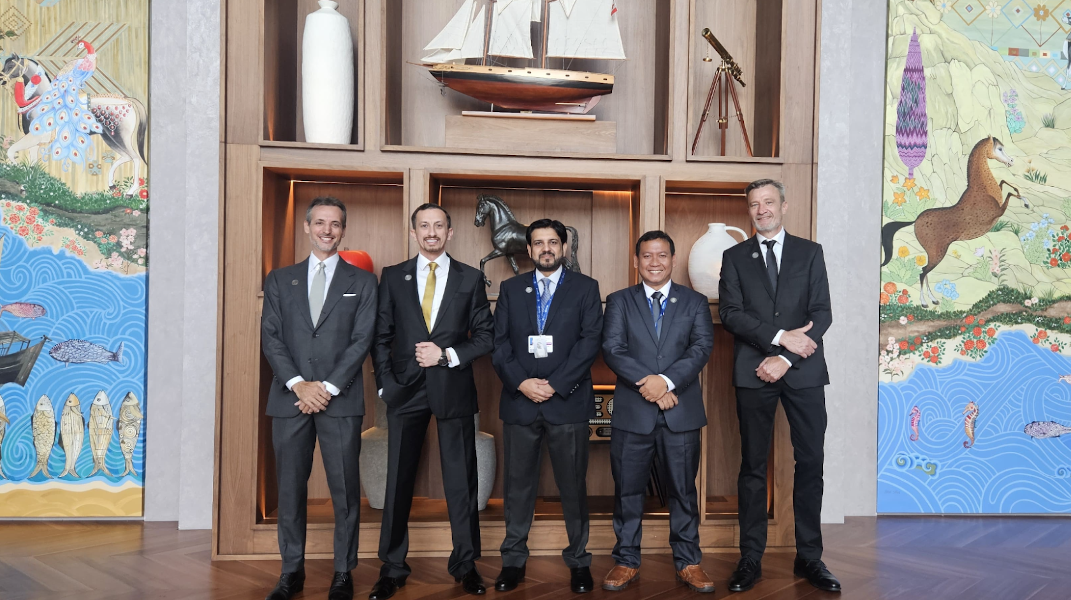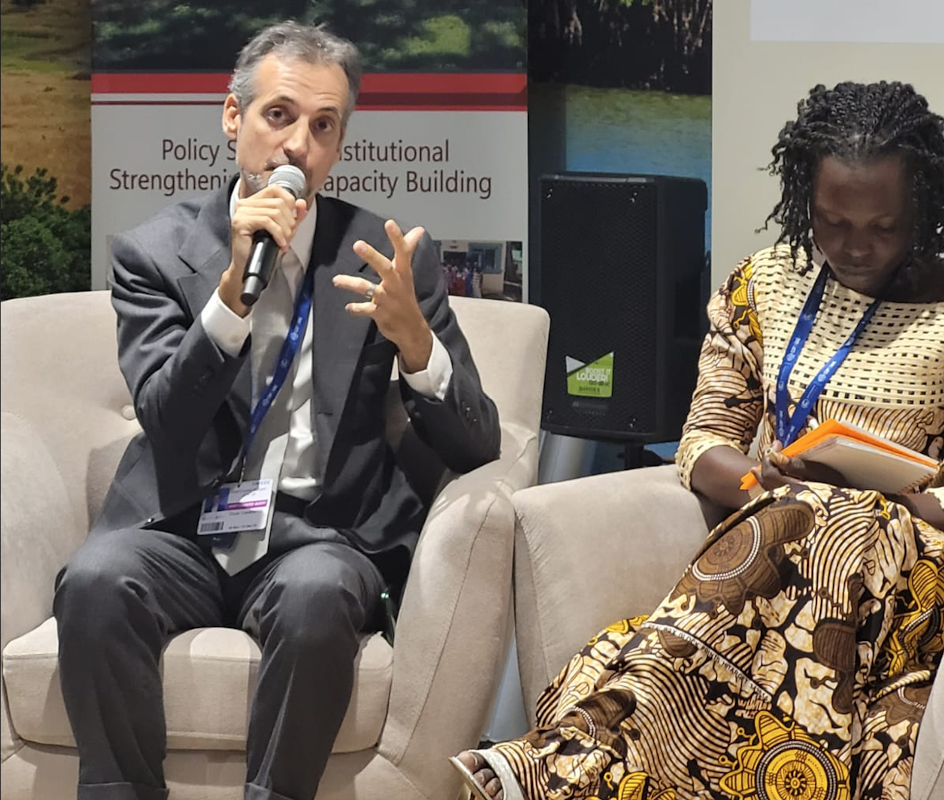As I stepped into COP28, the magnitude of the conference unfolded before me like a vast mosaic of global efforts and aspirations. Hundreds of pavilions buzzed with presentations, knowledge exchanges, and passionate debates, representing close to 100,000 attendees from 200 nations. It set the stage for an immersive experience that would emphasize the importance of connecting the dots between high-level decisions and the grassroots solutions that drive our work at Kopernik.
We were invited to COP28 as winners of the 2016 Zayed Sustainability Prize – a global award that recognizes and rewards small to medium enterprises, nonprofits, and schools for their impactful, innovative, and inspiring sustainable solutions.

Oscar Casalderrey, Managing Director of Last Mile Consulting (furthest left) with other winners and candidates to the Zayed Sustainability Prize.
High-Level Decisions: Shaping the Global Agenda
COP28 was a dizzying storm of high-stakes decisions, feverish negotiations, as well as commitments. World leaders convened to discuss the urgent need for collective action on the climate crisis. The urgency I felt there was palpable, emphasizing the critical challenges we face.
And some decisions were made: the first-ever recognition in a COP agreement of the need for a "just, orderly, and equitable transition away from fossil fuels" which unfortunately fell short of a commitment to a complete phase-out. Multiple pledges were also made, including an $800 million Loss and Damage fund, a tripling of renewable energy by 2030, doubled adaptation finance, and $100 billion per year for mitigation in developing countries. The first articulation of agri-food systems' link to emissions targets took root amidst the flurry of promises.
A sobering reality hummed beneath what was designed to be a celebratory environment. One could not help but reflect that even if all the promises made were fully implemented, the 1.5-degree Paris goal remains a distant shore, and the gaps to finance the energy transition in emerging economies are much too big. Echoes of past COPs’ commitments provided a stark reminder that ambition rarely translates seamlessly into concrete action.
These discussions emphasized the importance of coordinated action and commitment from all corners of the globe to prevent irreversible damage to our planet. As I listened to leaders from across the globe, I couldn't help but consider the alignment of these global priorities with Kopernik’s core mission.
Ground-Level Dialogues: Grassroots Discussions that Matter
Amidst the grandeur of global deliberations, what struck and inspired me the most were the ground-level dialogues—conversations that unfolded in smaller, dedicated spaces. Social enterprises, community representatives, activists, and civil society organizations shared their stories, challenges, and solutions. It was here, in these intimate discussions, that the true essence of the climate crisis and our collective responsibility emerged.

Oscar shared insights in discussions on eco-social innovation for off-grid rural communities with UNDP and the Mbolo Association.
We delved into the realities faced by communities directly impacted by climate change. The discussions echoed the very essence of Kopernik's approach—to listen, adapt, and work with communities to find effective solutions. These dialogues highlighted the importance of tailoring initiatives to specific local needs, an approach deeply embedded in our organizational culture.
Connecting the Dots: Our Initiatives in the Global Context
This is at the heart of Kopernik’s mission. As leaders on the global stage set ambitious targets, we attempt to bridge the gap by anchoring them in lived realities.
Whether it’s our work on Non-Timber Forest Products (NTFPs) in Kalimantan, where we model business plans for forest communities to improve their livelihoods while protecting their rainforest. Or our efforts in promoting the reduction of single-use plastic through behavior change initiatives across Indonesia. Or creating guidelines with practical and locally-available solutions for small-scale hotels and restaurants in Bali to become more environmentally sustainable. Or developing a Payment for Environmental Services (PES) scheme for water stewardship with regenerative agroforestry working with smallholder farmers, or our extensive work with farmers to return to sustainable agricultural practices.
These and many other initiatives, might seem like drops in a global ocean, but they are drops fueling a broader, interconnected web of community-level initiatives focused on finding innovative and scalable solutions shaping a sustainable future. And each and every one of them contributes to a larger global agenda.
Looking Ahead
Returning from COP28, after the whirlwind of global negotiations, one thing became crystal clear: an important part of progress lies in connecting the dots – between lofty goals and meaningful and grounded solutions, between scientific advancements and community knowledge, between the thunderous pronouncements of leaders and the quiet hum of the many organizations working hand in hand with communities, building resilience, supporting livelihoods and protecting the environment.
The significance of our work at Kopernik is now more evident to me, than ever before. Our commitment to addressing social and environmental challenges aligns seamlessly with our shared global imperative to combat the climate crisis. The experiences and insights gained from this global platform make clear the significant impact that grassroots efforts have on shaping a more resilient and sustainable future for all, driving positive change from the ground up.
So, let's keep the conversation going and share our stories, resources, and knowledge about what works, and what doesn’t. And move towards a future where the commitments of COP28 result not just in grand agreements, but in empowered communities, and a healthy planet, one sustainable solution at a time.


